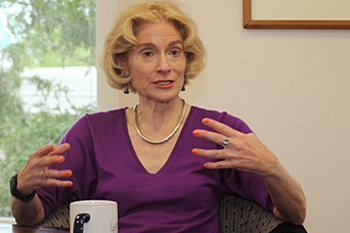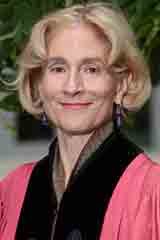In her charge to the class of 2013 at Lawrence University’s 164th commencement June 9, honorary degree recipient Martha Nussbaum told the 289 graduating seniors liberal education is critically important in producing democratic citizens and urged them to become advocates for it.

“What you can all do is to keep institutions like Lawrence strong,” said Nussbaum, the Ernst Freund Distinguished Service Professor of Law and Ethics at the University of Chicago. “You can also lobby with your local school board, your state and national representatives, for more attention to the liberal arts in public education at all levels. And, above all, just talk a lot about what matters to you about the education you’ve had here. Spread the word that what happens on this campus is not useless, but crucially relevant to the future of democracy in this nation and in the wider world.
In an interview prior to her commencement address, Nussbaum said liberal education is more relevant today than ever “because it stimulates a kind of respectful and deliberative political debate, and there’s no time in American history when we need that more.”
“It also stimulates curiosity and involvement in the different groups that make up our world,” added Nussbaum, “This is more crucial than ever if big problems, like environmental problems, racial animosity, religious animosity, are going to be solved. When people think narrowly about jobs, they’re selling short democracy, and we need to think, “What is it that keeps democracy healthy?’”
Nussbaum discussed several other higher education topics, including the emergence of MOOCs — Massive Open Online Courses, which she says may have a role for those with limited access to higher education, but are “just no substitute” for a traditional education
“It’s a poor second place, if second at all, because the interaction is the key to the education — interaction with other students in the classroom and the interaction with faculty,” said Nussbaum, a self-described “Luddite” who has no interest in teaching an online course. “I’m sure people try to make it more interactive, but it just isn’t the same thing.”

During a few visits to campus to visit a family friend’s son, who was a freshman at Lawrence this past academic year, Nussbaum sat in on several classes and came away impressed.
“One was a political science class about American politics and another was an introductory econ class,” said Nussbaum, “and I just thought, ‘I want to stay here the whole semester to have this class!’ I’m just amazed at the way these teachers can combine sophistication with absolute clarity. These introductory courses that a freshman was taking were of course accessible to freshmen, they were very clear. But I was also stimulated. I was getting something out of the way the issues were presented. I just think they’re just so lucky to have that.
“Of course, in Freshman Studies, they do music!,” Nussbaum added. “This is the only place I’ve ever seen of which that’s true. Most places, they expect that every faculty member could teach Shakespeare, but they don’t ever expect that faculty could teach Stravinsky, but here they are in Freshman Studies. They’re all doing Stravinsky and I think that’s fantastic.”
Download the entire conversation with Prof. Nussbaum or listen online
About Lawrence University
Founded in 1847, Lawrence University uniquely integrates a college of liberal arts and sciences with a nationally recognized conservatory of music, both devoted exclusively to undergraduate education. It was selected for inclusion in the Fiske Guide to Colleges 2013 and the book “Colleges That Change Lives: 40 Schools That Will Change the Way You Think About College.” Individualized learning, the development of multiple interests and community engagement are central to the Lawrence experience. Lawrence draws its 1,500 students from nearly every state and more than 50 countries. Follow Lawrence on Facebook.